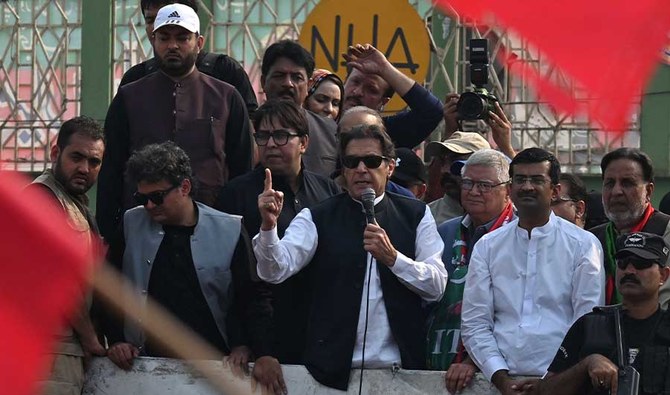ISLAMABAD: Pakistani former prime minister Imran Khan on Monday announced he would file a Rs10 billion defamation case against the chief election commissioner for raising questions over his honesty in separate verdicts for misdeclaration of assets and receiving illegal funds from foreign countries for his political party.
The Election Commission of Pakistan (ECP) in August ruled that Khan’s Pakistan Tehreek-e-Insaf (PTI) party had received millions of dollars in funds from foreign countries, including the United States, the United Arab Emirates, the UK, and Australia.
In a separate verdict this month, the ECP disqualified Khan from public office in a unanimous verdict in a case registered against the ex-premier for failing to declare assets he earned from the sale of state gifts. Khan has appealed both rulings.
Addressing a protest rally on Monday, Khan said ECP chief Sikandar Sultan Raja had “destroyed” his reputation.
“I am filing a defamation case against him because he raised questions over my honesty,” Khan told a crowd attending his ‘long march’ to the capital, launched last Friday with the aim to cover a distance of 380 kilometers to the capital, Islamabad, to force Prime Minister Shehbaz Sharif’s coalition government to announce early elections.
“Sikandar Sultan, I will take you to court … so that in the future, you do not destroy anyone’s reputation on someone else’s instructions,” he said, alleging that the verdicts were announced with the support of the Sharif government.
Addressing the country’s powerful military establishment, Khan urged it to “listen to the nation’s voice.”
Referring to his victory on seven out of eight seats in recent by-elections, Khan said: “I am giving a message with due respect: For God’s sake, listen to the nation’s voice.”
Khan, once widely believed to have been supported by Pakistan’s powerful military establishment, is now considered to have fallen out with the army since his ouster in a parliamentary vote of no-confidence in April this year. The former premier and supporters of his PTI party have lately been criticizing the Pakistani military, which has ruled the South Asian country for almost half of its 75-year history, and the army chief, for not intervening to block his ouster.
The criticism has reached its peak since last week when in a rare press conference last Thursday, ISI chief Lt. Gen. Nadeem Anjum criticized Khan for anti-military remarks and portraying General Bajwa as a “traitor” among his followers. The following day, Friday, Khan launched his ‘long march’ to the capital and in daily speeches since has been slamming military officials, including most recently the ISI director-general for counter intelligence, Major General Faisal Naseer, and the agency’s Islamabad sector commander, Brig. Fahim Raza.



















